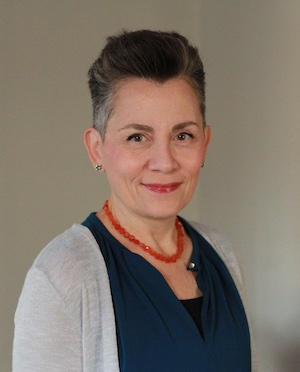By Marina Catullo
When Adriana Zavala attended Brown University for graduate school in the 1990s, students didn’t have many options to take history classes in Latin American art. Today, Zavala estimates that more than 125 universities offer art history classes in Latin American art. Still, art history is primarily taught in a way that favors the Eurocentric. When Zavala received an invitation to participate in Phi Beta Kappa’s Visiting Scholar Program, she was excited for the opportunity to share her work on modern Mexican and contemporary U.S. Latinx art with a broader audience. Zavala considers herself a scholar, but also an ambassador for the material that she covers.
“I think many universities, even if they have art history programs, don’t have those particular fields represented among their faculty,” Zavala said. “So it’s always been important for me to intervene in a discipline and bring other stories into dialogue with the discipline and to put pressure on the discipline of art history.”
Through the program, ΦBK Visiting Scholars spend two days with each college or university they visit and take full part in the academic life of the institution. This includes meeting informally with students and faculty members, participating in classroom discussions and seminars, and giving a lecture that is open to both the academic community and general public. The mix of “folks from the community as well as students” during her presentation was exciting Zavala said. “It’s really, I think, important for universities to be public-facing and to share their resources and the expertise of their faculty with the larger community,” she mused. “And so in that sense, I think this [the Visiting Scholar Program] is a really wonderful program.”
For the public lecture, every university and college chose Zavala’s “Of Bodies and Borders” lecture, which she is currently developing into a book project. “Of Bodies and Borders” examines works by Latin American-descended contemporary artists living in the United States, whose lives have been marked by and whose art explores the violence of colonialism, empire, and the ongoing politicization of borders. Through the study of works by Adriana Corral, Teresita Fernández, Guadalupe Maravilla, Carlos Martiel, Sandy Rodriguez, and Juan Sánchez, Zavala explores how racialization as a violent form of social differentiation cannot be separated from the critical study of geopolitical power.
Some of the artists’ works engage in what Zavala describes as “counter-mapping the borders of the nation state.” These works help inform a historical understanding of the complicated relationship between the United States and Latin America, including the fact that up until the mid-19th century, all of what we now consider the American West belonged to Mexico, showing that anti-immigrant rhetoric is often grounded in historical erasure. Other works examined in the lecture use images of the human body to show the toll of this violent political rhetoric and policy. While the artwork is often painful and the material is challenging, Zavala believes that “the academy is a place for learning through discomfort” and that faculty do a disservice to students when they sanitize what they teach.
The exploration of art through this historical lens is essential to Zavala because “artists don’t live in a vacuum.” Artists mediate and respond to the world around them. For example, Zavala gets angry when people interpret Mexican artist Frida Kahlo’s art through the exclusive lens of her personal experiences. While her work was of course influenced by her personal experiences, it was also “absolutely radical in the way that she represented the female body,” Zavala said. As a female artist in a male-dominated arena, Kahlo’s work required “incredible courage and creativity,” Zavala noted. Her art reflected contemporary Mexican culture as it evolved in a post-revolutionary Mexico.
“What she does is she uses the self, and she uses personal experience, to open up a whole conversation about politics, about culture, about the experience of women, the experience of the disabled, the experience of the marginalized,” Zavala explained. “And that’s really what we need to center when we study and interpret her work.”
Zavala has already visited Trinity University, Bucknell University, Bowdoin College, Saint Joseph’s University, the University of South Carolina, and Sweet Briar College. She will be visiting Alma College and Hope College this fall.
Marina Catullo is a graduate of the University of South Carolina where she studied political science and English. She was inducted into Phi Beta Kappa there in April 2021. The University of South Carolina is home to the Alpha of South Carolina chapter of Phi Beta Kappa.




